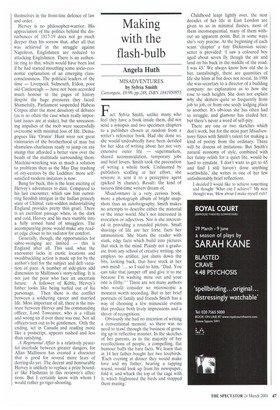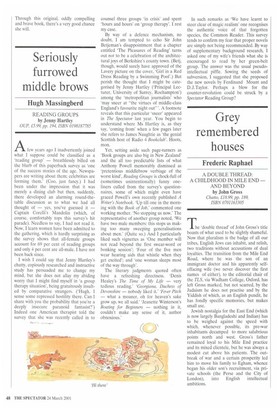Making with the flash-bulb
Angela Huth
MISADVENTURES by Sylvia Smith
Canongate, £9.99, pp.248, ISBN 1841950955
Fact: Sylvia Smith, unlike many who feel they have a book inside them, did not send a synopsis and two specimen chapters to a publisher chosen at random from a writer's reference book. Had she done so, she would undoubtedly have been derided for her idea of writing about her not very extensive outer life — supermarkets, shared accommodation, temporary jobs and brief lovers. Smith took the precaution of wrting a whole book. Undaunted by publishers scoffing at her effort, she rewrote it, sent it to a perceptive agent (picked by chance). Result: the kind of success first-time writers dream of.
Misadventures is a very curious book, more a photograph album of bright snapshots than an autobiography. Smith makes no attempts to describe either the material or the inner world. She's not interested in evocation or adjectives. Nor is she interested in providing a rounded picture. Small shavings of life are her forte, facts her ammunition. She blasts the reader with stark, edgy facts which build into pictures that stick in the mind. Plainly not a graduate from any school of creative writing, she employs no artifice, just slams down the bits, looking back, that have stuck in her own mind: '... so I said to him, "Dad. You can take that jumper off and give it to me because I'm washing mine out and your one is filthy."' There are not many authors who would consider so microscopic a moment worth recording. But in her brief portraits of family and friends Smith has a way of choosing a few minuscule events that produce both lively impressions and a shiver of recognition.
Obviously she had no intention of writing a conventional memoir, so there was no need to trawl through the business of growing up in reflective manner. In the sketches of her parents, as in the majority of her recollections of people, a compelling, flat humour buffs the bare facts. We learn that at 14 her father bought her two lovebirds. 'Each evening at dinner they would make love and my father, hearing a tapping sound, would look up from his newspaper, fold it, and whack the top of the cage with it, which frightened the birds and stopped them mating.'
Childhood leapt lightly over, the next decades of her life in East London are given to us in minimal flashes, most of them inconsequential many of them without an apparent point. But in some ways she's very precise. At the beginning of each scant 'chapter' a tiny Dickensian scenesetter is provided: 'I saw a coloured boy aged about seven fly though the air and land on his back in the middle of the road. I was 43.' We always know how old she is but, tantalisingly, there are quantities of life she hints at but does not reveal. In 1988 she was secretary to a director of a building company: no explanation as to how she rose to such heights. She does not explain why she skitters quite so frequently from job to job, or from one seedy lodging place to another. It's obvious she has often had to struggle, and glamour has eluded her, but there's never a word of self-pity.
There are one or two sketches which don't work, but for the most part Misadventures fizzes with Smith's talent for making a kind of poetry from the ordinary. There will be dozens of imitations. But Smith's natural economy of style, combined with her funny relish for a quiet life, would be hard to emulate. 'I don't want to get to 65 and find I still haven't done anything worthwhile,' she writes in one of her few unfashionably brief reflections.
I decided I would like to achieve something and thought 'What can I achieve?' My next thought was, 'How about I make myself rich?
Through this original, oddly compelling and brave book, there's a very good chance she will.















































































 Previous page
Previous page